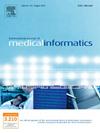建模未知:医疗保健中不确定性感知机器学习的愿景。
IF 4.1
2区 医学
Q2 COMPUTER SCIENCE, INFORMATION SYSTEMS
International Journal of Medical Informatics
Pub Date : 2025-06-25
DOI:10.1016/j.ijmedinf.2025.106014
引用次数: 0
摘要
在生物医学数据激增和数据驱动的临床支持前景的推动下,机器学习(ML)与医疗保健的整合正在加速。在这方面的一个关键挑战是管理医学推理和决策中普遍存在的不确定性。尽管其重要性得到公认,但在临床人工智能系统的设计和评估中,不确定性往往被低估。在这里,我们报告了一个专门讨论医疗人工智能不确定性建模的特刊的编辑概述,该特刊收集了解决这一关键差距的理论、方法和实践贡献。在这些作品中,作者揭示,只有不到4%的研究明确地解决了不确定性,并提出了替代的设计原则,如优化临床净收益或嵌入可解释性与置信度估计。值得注意的贡献包括实时预测可靠性的RelAI系统,关于不确定性沟通如何影响临床解释的实证研究结果,以及表格数据中分布外检测的基准。此外,这个问题强调了因果推理和异常检测的使用,以增强系统的鲁棒性和可问责性。总之,这些研究认为,表达、沟通和操作不确定性不仅对临床安全至关重要,而且对于在人工智能驱动的护理中建立信任也至关重要。因此,这个特殊问题将不确定性从医疗保健中负责任的ML部署中的限制重新定位为基础资产。本文章由计算机程序翻译,如有差异,请以英文原文为准。
Modeling unknowns: A vision for uncertainty-aware machine learning in healthcare
The integration of machine learning (ML) into healthcare is accelerating, driven by the proliferation of biomedical data and the promise of data-driven clinical support. A key challenge in this context is managing the pervasive uncertainty inherent in medical reasoning and decision-making. Despite its recognized importance, uncertainty is often underrepresented in the design and evaluation of clinical AI systems.
Here we report an editorial overview of a special issue dedicated to uncertainty modeling in medical AI, which gathers theoretical, methodological, and practical contributions addressing this critical gap. Across these works, authors reveal that fewer than 4% of studies address uncertainty explicitly, and propose alternative design principles—such as optimizing for clinical net benefit or embedding explainability with confidence estimates. Notable contributions include the RelAI system for real-time prediction reliability, empirical findings on how uncertainty communication shapes clinical interpretation, and benchmarks for out-of-distribution detection in tabular data. Furthermore, this issue highlights the use of causal reasoning and anomaly detection to enhance system robustness and accountability.
Together, these studies argue that representing, communicating, and operationalizing uncertainty are essential not only for clinical safety but also for building trust in AI-driven care. This special issue thus repositions uncertainty from a limitation to a foundational asset in the responsible deployment of ML in healthcare.
求助全文
通过发布文献求助,成功后即可免费获取论文全文。
去求助
来源期刊

International Journal of Medical Informatics
医学-计算机:信息系统
CiteScore
8.90
自引率
4.10%
发文量
217
审稿时长
42 days
期刊介绍:
International Journal of Medical Informatics provides an international medium for dissemination of original results and interpretative reviews concerning the field of medical informatics. The Journal emphasizes the evaluation of systems in healthcare settings.
The scope of journal covers:
Information systems, including national or international registration systems, hospital information systems, departmental and/or physician''s office systems, document handling systems, electronic medical record systems, standardization, systems integration etc.;
Computer-aided medical decision support systems using heuristic, algorithmic and/or statistical methods as exemplified in decision theory, protocol development, artificial intelligence, etc.
Educational computer based programs pertaining to medical informatics or medicine in general;
Organizational, economic, social, clinical impact, ethical and cost-benefit aspects of IT applications in health care.
 求助内容:
求助内容: 应助结果提醒方式:
应助结果提醒方式:


